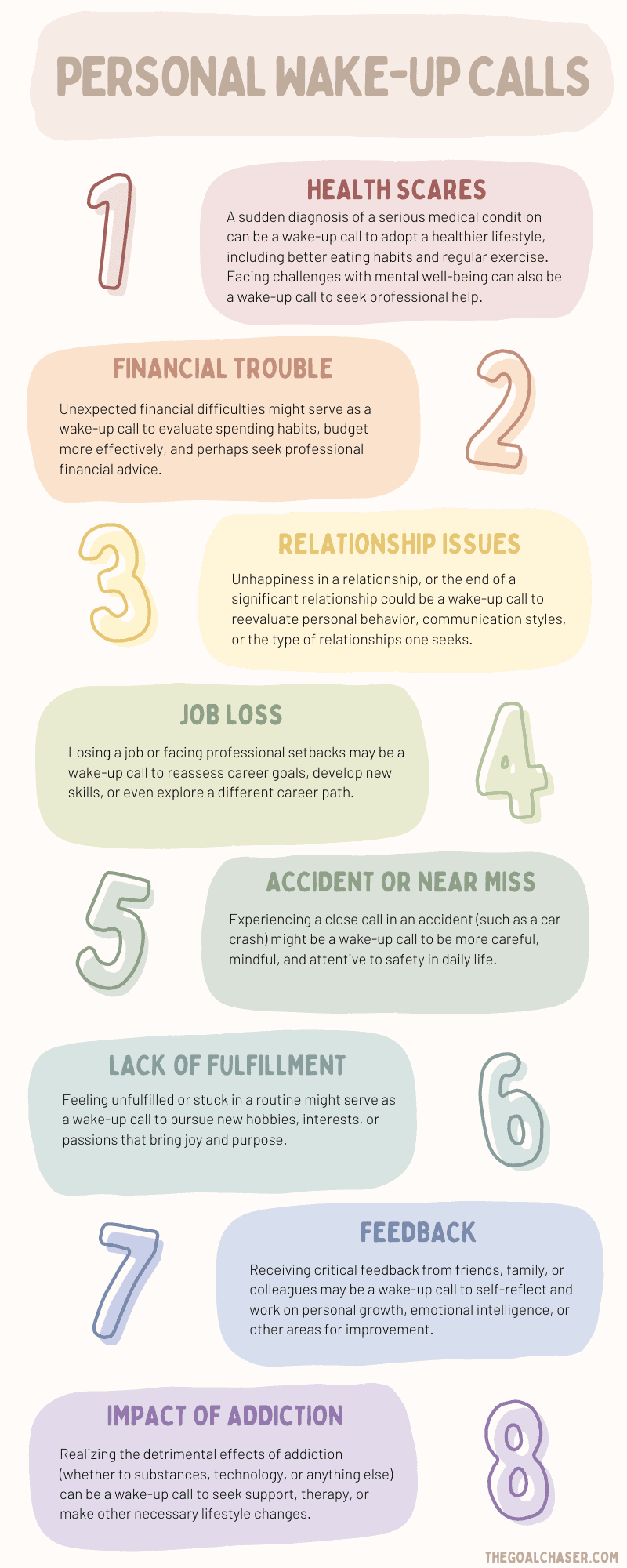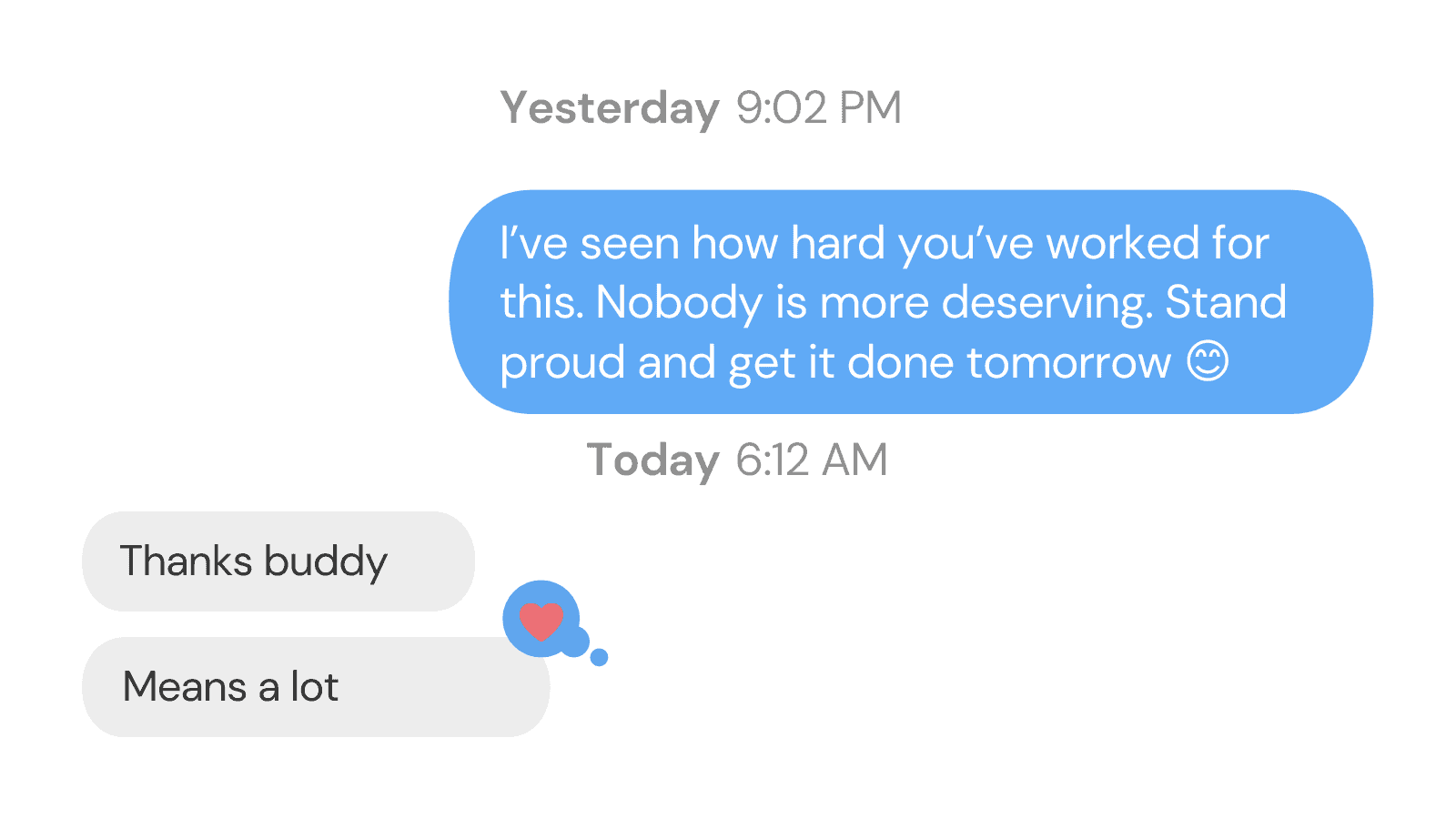Wake Up Calls – Meaning & Examples To Consider
A “wake up call” is a phrase we often hear, but what does it really mean?
In this post, we’ll delve into the wake up call meaning and explore how it’s used in various contexts.
Wake Up Call – A Literal Meaning
Originally, a wake-up call referred to a service provided by hotels where a guest could request a call at a specific time in the morning to ensure they woke up.
This is a practical way to help guests rise early for meetings, flights, or other scheduled activities.
Due to smart phones and technological advances, these types of wake up calls are obviously not as popular these days.
Wake Up Call – A Figurative Meaning
In a broader sense, a wake-up call serves as a metaphor, that signifies an event or moment that prompts a realization, demands attention, or inspires a change in behavior.
It’s like a sudden alert that urges one to take action or make a change.
It typically comes after an unexpected event or situation that highlights a problem or risk, prompting a reevaluation of current practices or behaviors.
A wake-up call is essentially a catalyst that pushes someone to make necessary adjustments or transformations, whether in personal life, business, or societal matters.
It’s a symbol for a moment of clarity, that hopefully leads to growth or improvement.
Personal Wake Up Call Examples
Personal wake-up calls can vary widely depending on individual circumstances and life experiences.
Here’s a list of examples that might resonate with different people:
- Health Scare: A sudden diagnosis of a serious medical condition can be a wake-up call to adopt a healthier lifestyle, including better eating habits and regular exercise.
- Financial Trouble: Unexpected financial difficulties might serve as a wake-up call to evaluate spending habits, budget more effectively, and perhaps seek professional financial advice.
- Relationship Breakdown: The end of a significant relationship could be a wake-up call to reevaluate personal behavior, communication styles, or the type of relationships one seeks.
- Job Loss: Losing a job or facing professional setbacks may be a wake-up call to reassess career goals, develop new skills, or even explore a different career path.
- Accident or Near Miss: Experiencing a close call in an accident (such as a car crash) might be a wake-up call to be more careful, mindful, and attentive to safety in daily life.
- Lack of Fulfillment: Feeling unfulfilled or stuck in a routine might serve as a wake-up call to pursue new hobbies, interests, or passions that bring joy and purpose.
- Negative Feedback: Receiving critical feedback from friends, family, or colleagues may be a wake-up call to self-reflect and work on personal growth, emotional intelligence, or other areas for improvement.
- Struggles with Mental Health: Facing challenges with mental well-being could be a wake-up call to seek professional help, practice mindfulness, or make changes to one’s lifestyle to improve mental health.
- Failure in Education: Failing a course or struggling academically may serve as a wake-up call to reevaluate study habits, seek tutoring, or even reconsider educational and career goals.
- Impact of Addiction: Realizing the detrimental effects of addiction (whether to substances, technology, or anything else) can be a wake-up call to seek support, therapy, or make other necessary lifestyle changes.
These examples highlight how personal wake-up calls are often triggered by significant or challenging life events.
They push individuals to reflect on their current situation and can motivate them to make positive changes to their current situation – whether by being forced to, or having a renewed motivation to make a change.
Business Wake Up Call Examples
Business wake-up calls can be instrumental in alerting leaders and organizations to issues that need immediate attention or strategic changes.
Here’s a list of examples that might be relevant to different businesses:
- Decline in Sales: A sudden or consistent decline in sales can be a wake-up call to reevaluate marketing strategies, product offerings, or customer engagement tactics.
- Customer Complaints: An increase in customer complaints or negative reviews may serve as a wake-up call to address product quality, customer service, or other areas that impact customer satisfaction.
- Employee Turnover: High rates of employee turnover might be a wake-up call to assess company culture, management practices, and employee benefits to improve retention.
- Competitor Success: A competitor’s significant success with a new product or market strategy could be a wake-up call to innovate, adapt, and respond to market changes more effectively.
- Regulatory Compliance Issues: Encountering legal or regulatory problems may serve as a wake-up call to review and strengthen compliance protocols, training, and legal oversight.
- Data Breach or Security Incident: A cybersecurity incident can be a wake-up call to invest in better security measures, policies, and education to protect sensitive information.
- Supply Chain Disruptions: Challenges or failures in the supply chain could be a wake-up call to diversify suppliers, invest in better risk management, or reassess inventory strategies.
- Financial Mismanagement: Discovering financial mismanagement or irregularities might serve as a wake-up call to implement stricter financial controls, oversight, and transparency.
- Failure of a New Product Launch: The failure of a new product or service launch may be a wake-up call to reassess market research, product development processes, or marketing strategies.
- Environmental or Social Impact Concerns: Public outcry or stakeholder concerns regarding the environmental or social impact of business practices could be a wake-up call to adopt more sustainable and responsible business practices.
- Changes in Market Trends: Shifts in market demands, consumer behavior, or industry trends may serve as a wake-up call to adapt and evolve to stay competitive.
- Pandemic or Natural Disaster Response: An ineffective response to a global crisis like a pandemic or natural disaster could be a wake-up call to strengthen crisis management plans and contingency strategies.
These examples illustrate how business wake-up calls often come in response to internal or external challenges, signaling a need for strategic reassessment, action, or transformation.
Recognizing and responding to these wake-up calls can be critical for the ongoing success and resilience of a business.
Wake Up Call Examples As A Society
Societal wake-up calls are events or situations that draw attention to broader issues within a community, country, or even globally.
They often demand a collective response or a change in societal norms, policies, or behaviors.
Here’s a list of examples:
- Natural Disasters: Events like hurricanes, earthquakes, or floods can be wake-up calls to invest in infrastructure, preparedness, and climate change mitigation.
- Public Health Crises: The recent pandemic served as a wake-up call for many countries to invest in healthcare systems, emergency response capabilities, and public health policies.
- Economic Inequality: Rising income inequality and poverty may act as wake-up calls to reassess tax policies, social welfare programs, and economic structures to promote greater equity.
- Environmental Degradation: Widespread deforestation, pollution, or species extinction might be wake-up calls to enact stronger environmental protections and sustainable practices.
- Social Unrest and Protests: Movements like Black Lives Matter have been wake-up calls for societies to confront racial inequality, police brutality, and systemic discrimination.
- Education Gaps: Disparities in educational opportunities and outcomes can be wake-up calls to invest in education, reduce barriers, and promote equal access.
- Mental Health Epidemic: Rising rates of mental health issues, especially among young people, may be a wake-up call to increase mental health funding, support, and awareness.
- Technological Risks: Incidents involving data privacy violations or the malicious use of technology can be wake-up calls to regulate technology, protect privacy, and ensure ethical usage.
- Political Scandals or Corruption: High-profile political scandals or corruption may serve as wake-up calls to enhance transparency, accountability, and democratic practices.
- Terrorist Attacks or Violence: Incidents of terrorism or widespread violence can be wake-up calls to address underlying causes, enhance security, and promote peace and tolerance.
- Refugee Crises: Humanitarian crises, such as mass migrations due to war or persecution, can be wake-up calls for international cooperation, compassion, and policy reform.
- Gender Inequality: Continued gender pay gaps, discrimination, and violence against women might be wake-up calls to enforce gender equality laws, education, and societal change.
- Youth Activism: The rise of youth activism on issues like climate change may be a wake-up call to listen to younger generations and involve them in decision-making processes.
- Opioid Epidemic: The widespread abuse of opioids and related deaths might serve as a wake-up call to address addiction, healthcare practices, and pharmaceutical regulations.
Societal wake-up calls often highlight complex, interconnected issues that require a multifaceted response from governments, organizations, and citizens alike.
Recognizing and acting upon these wake-up calls can lead to profound societal change and progress.
Red Flags To Consider
The meaning of a ‘wake up call’ extends beyond the simple act of waking someone up in the morning 🙂
Whether in our personal lives, businesses, or society as a whole, wake-up calls serve as significant turning points that provoke thought, reflection, and often, much-needed change.
Understanding this term can help us recognize pivotal moments in our lives and motivate us to take positive steps forward. So next time you encounter a wake-up call, consider what it’s telling you, and don’t be afraid to take action. It might just be the catalyst you need for meaningful transformation.
If you’re interested in a personal life-audit or self-reflection, then be sure to check out:







